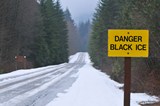Ottman v Great Lakes Gaming: Court of Appeals Denies Plaintiff Jury Trial
 As a result of a recent unpublished decision by the Michigan Court of Appeals, Ottman v Great Lakes Gaming of Michigan (unpublished opinion issued December 11, 2012), plaintiff Leetta Ottman will not have an opportunity to present her case to a jury of her peers.
As a result of a recent unpublished decision by the Michigan Court of Appeals, Ottman v Great Lakes Gaming of Michigan (unpublished opinion issued December 11, 2012), plaintiff Leetta Ottman will not have an opportunity to present her case to a jury of her peers.
In Ottman, the court rejected the plaintiff’s claim, which stemmed from a slip and fall accident in a parking lot of a casino. The plaintiff slipped and fell on a sidewalk covered with “black ice.” Black ice, sometimes called clear ice, refers to a coating of ice that is virtually invisible to the eye. In other words, an average person is unlikely to detect the presence of the ice, even when looking directly at it. The Ottman court disposed of the plaintiff’s claim by invoking the “open and obvious” doctrine. According to the court, open and obvious dangers are those dangers “that an average person with ordinary intelligence would have discovered . . . upon casual inspection.” This is the classic definition of the open and obvious doctrine. However, black ice does not fit neatly into that definition. By its very definition, black ice is impossible to see “upon casual inspection,” even for a person “with ordinary intelligence.”
In response, Michigan courts have broadened the inquiry of the open and obvious doctrine to include consideration of the weather conditions accompanying the incident. The Ottman court held that black ice is open and obvious when there are “wintry conditions that by their nature would have alerted an average user of ordinary intelligence to discover the danger upon casual inspection.” The take away for Michiganders is that when battling our cold winters, one must be ever vigilant of black ice; that is, act as if black ice is present. The reason being that the current state of Michigan law makes it exceedingly difficult to achieve recourse for slip and fall victims.

